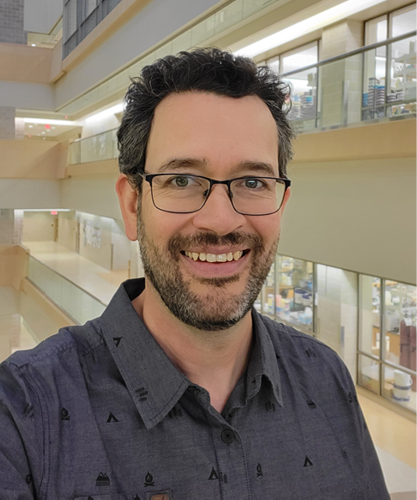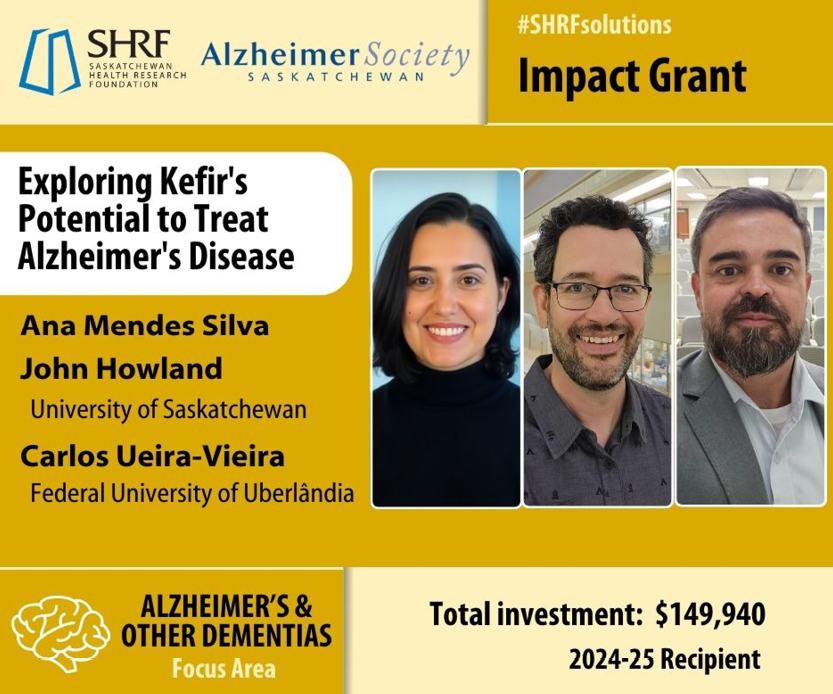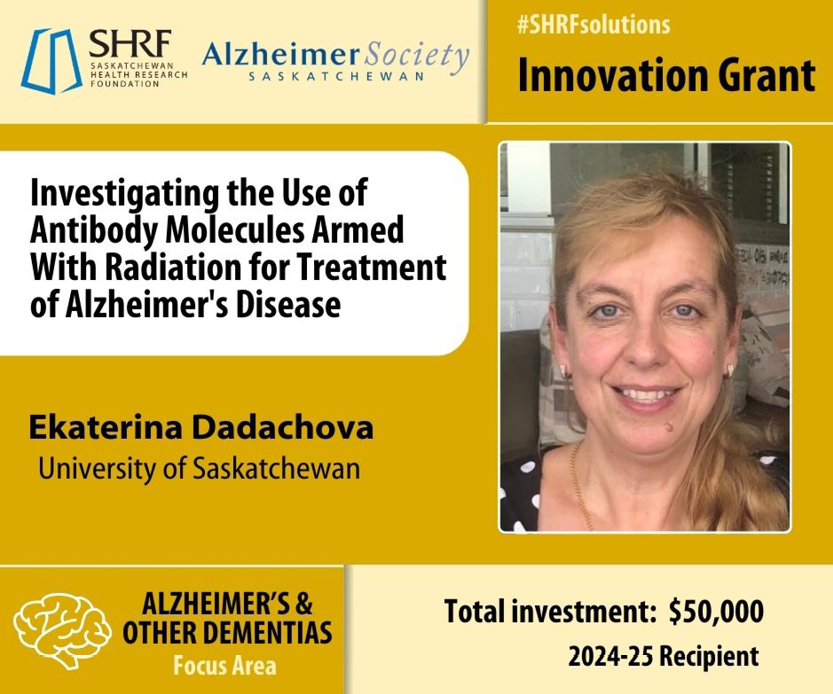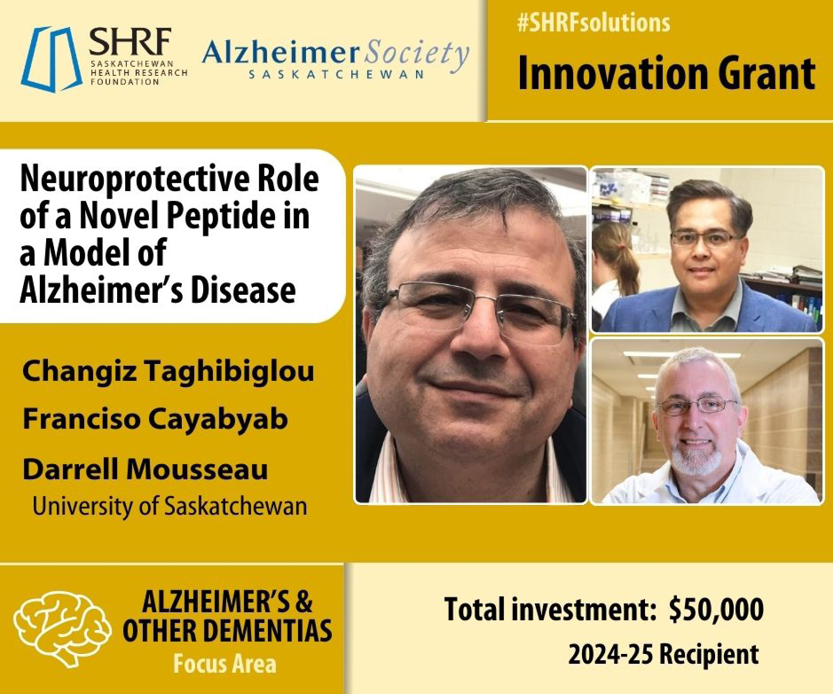Saskatchewan Research
Learn more about current dementia research taking place across the province to help people living with dementia and their care partners to live the best life possible.
Dementia research has the power to transform lives.
Your support is the key to unlocking a cure, better care, and providing hope for everyone to live their best life.
The Alzheimer Society of Saskatchewan works with provincial and national funding partners to unlock local research opportunities.
Below are several Saskatchewan researchers whose work we are proud to be co-funding throughout 2025.
Alzheimer Society Research Program Funding Recipients
Dr. Julie Kosteniuk
Dr. Julie Kosteniuk from the University of Saskatchewan is leading an innovative study to improve dementia care for older adults in rural communities. Many face barriers like long travel distances and mobility challenges, making it difficult to access traditional clinic-based care. This research explores how home-based virtual memory clinics—supported by in-person tech assistance—can help close that gap.

Partnering with two rural memory clinic teams in southern Saskatchewan, Dr. Kosteniuk is adapting a proven in-person model into a virtual format. The study unfolds in three phases, with ongoing feedback from patients, caregivers, and clinicians shaping the model to ensure it’s both effective and user-friendly.
By focusing on real-world experiences and outcomes, the team aims to create a virtual care model that truly works for rural residents. This research supports national efforts to reduce barriers to dementia care and could pave the way for more accessible, home-based memory clinics across Canada.
Congratulations to Dr. Kosteniuk for receiving the Alzheimer Society Research Program’s New Investigator Grant.
Dr. John Howland
Dr. John Howland is exploring one of the most pressing questions in dementia research: how can we protect the brain’s synapses—the vital connections between neurons—from the damage caused by Alzheimer’s disease? His team is investigating the role of tau, a protein that accumulates in the brains of people with Alzheimer’s disease and is linked to early cognitive decline. While tau-lowering therapies are gaining attention, little is known about how removing tau actually preserves brain function.

In a world-first study using genetically modified rats that lack the tau protein, Dr. Howland is examining how age and sex influence the brain’s ability to resist synapse loss and memory problems. Through a series of behavioral tests and advanced imaging techniques, his team is uncovering how tau removal affects learning and memory in male and female rats as they age.
This research could transform how we approach Alzheimer’s disease treatment. By identifying which cognitive functions are protected—and in whom—Dr. Howland’s study aims to help tailor future tau-lowering therapies to maximize benefits and minimize side effects, bringing us closer to more personalized, effective treatments for people living with dementia.
Congratulations to Dr. Howland for being awarded the Alzheimer Society Research Program’s Proof of Concept Grant.
Saskatchewan Health Research Foundation (SHRF) Funding Recipients
Drs. Ana Mendes Silva, John Howland, and Carlos Ueira-Vieira
Changiz Taghibiglou, Sara Mardanisamani, Andrew Kirk, and Kerry Bishop from the University of Saskatchewan are the researchers who have been awarded the Solutions Program - Impact Grant in the focus area of Alzheimer's Disease & Other Dementias.

Can a fermented milk drink help fight Alzheimer’s disease? That’s the question driving an exciting new study led by Drs. Ana Mendes Silva, John Howland, and Carlos Ueira-Vieira at the University of Saskatchewan, in collaboration with the Federal University of Uberlândia. With support from the SHRF Solutions Grant, their team is exploring the potential of kefir—a probiotic-rich drink—to slow or prevent Alzheimer’s symptoms.
The researchers have identified three natural compounds in kefir (PW, M20, and M25) that may be able to reach the brain and combat the buildup of harmful plaques linked to memory loss. Now, they’re testing how long these compounds remain in the body and whether they can improve cognitive symptoms in mice with Alzheimer’s-like conditions.
Dr.s Silva, Howland, and Ueira-Vieira have been awarded the Saskatchewan Health Research Foundation’s - Solutions Program Impact Grant to advance their research.
This innovative, food-based approach could open the door to more accessible and natural treatments for dementia.
Dr. Ekaterina Dadachova
Dr. Ekaterina Dadachova from the University of Saskatchewan is taking a bold new approach to Alzheimer’s disease treatment—by borrowing tools from cancer therapy. Her team is adapting a technique called radioimmunotherapy, which uses radiation linked to antibodies to precisely target harmful cells.

In this study, the target is amyloid beta plaques—one of the hallmarks of Alzheimer’s disease. If successful, this could represent a completely new way to treat Alzheimer’s disease, using a method that’s never before been applied to neurodegenerative conditions.
Dr. Dadachova has been awarded the Saskatchewan Health Research Foundation’s - Solutions Program Innovation Grant to advance her research.
By repurposing cancer-fighting technology, Dr. Dadachova’s research could open the door to more targeted, effective treatments for people living with dementia.
Drs. Changiz Taghibiglou, Francisco Cayabyab, and Darrell Mousseau
Drs. Changiz Taghibiglou, Francisco Cayabyab, and Darrell Mousseau from the University of Saskatchewan are investigating a powerful new molecule with the potential to protect the brain from Alzheimer’s disease. Their research centers on a tiny peptide called Indip, which may help shield brain cells from the toxic effects of Alzheimer’s-related proteins.

Since the brain is composed of nearly 90%, disruptions in how it processes fats could play a key role in the disease. The team is testing Indip in lab-grown brain cells to see if it can block damage at the cellular level—an early step toward developing a new class of treatments.
Drs. Changiz Taghibiglou, Francisco Cayabyab, and Darrell Mousseau have been awarded the Saskatchewan Health Research Foundation’s - Solutions Program Innovation Grant to advance their research.
Their study could pave the way for novel, targeted therapies that protect brain health and slow the progression of dementia.
